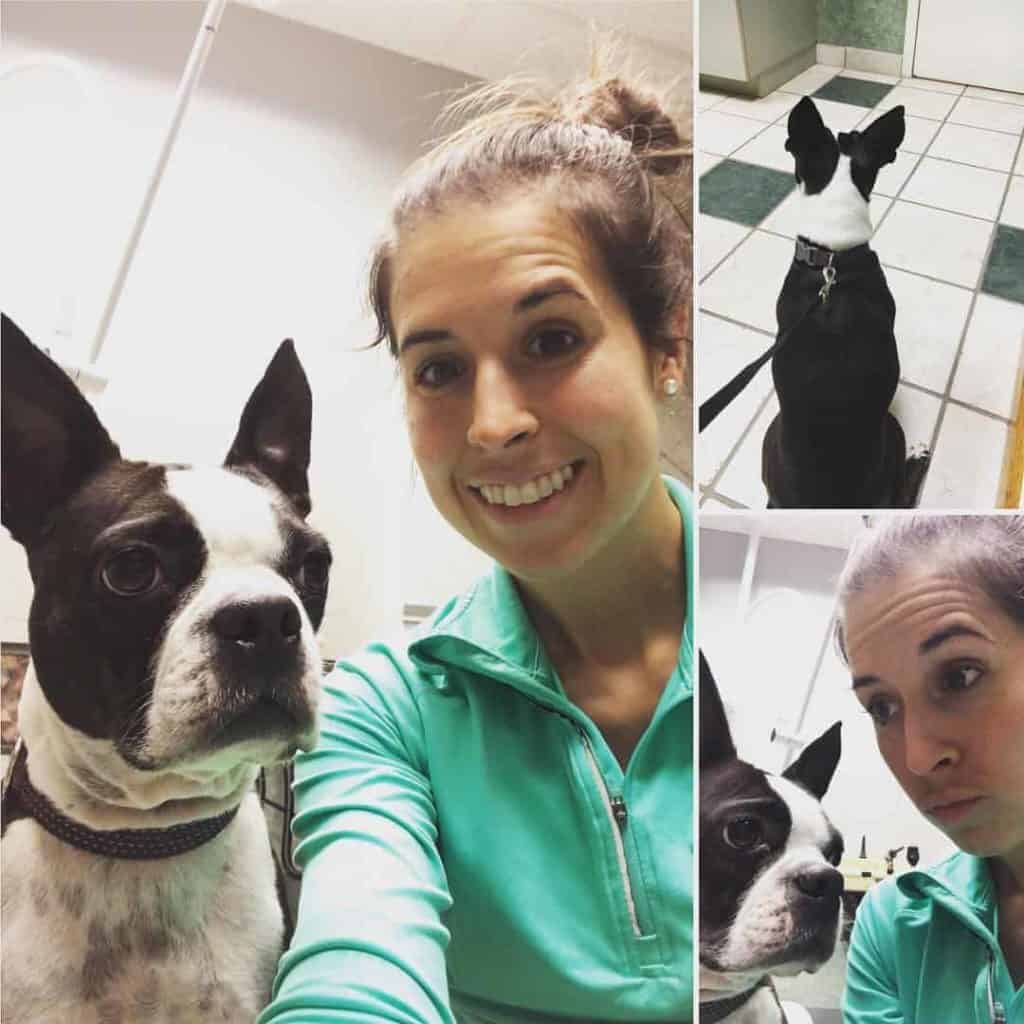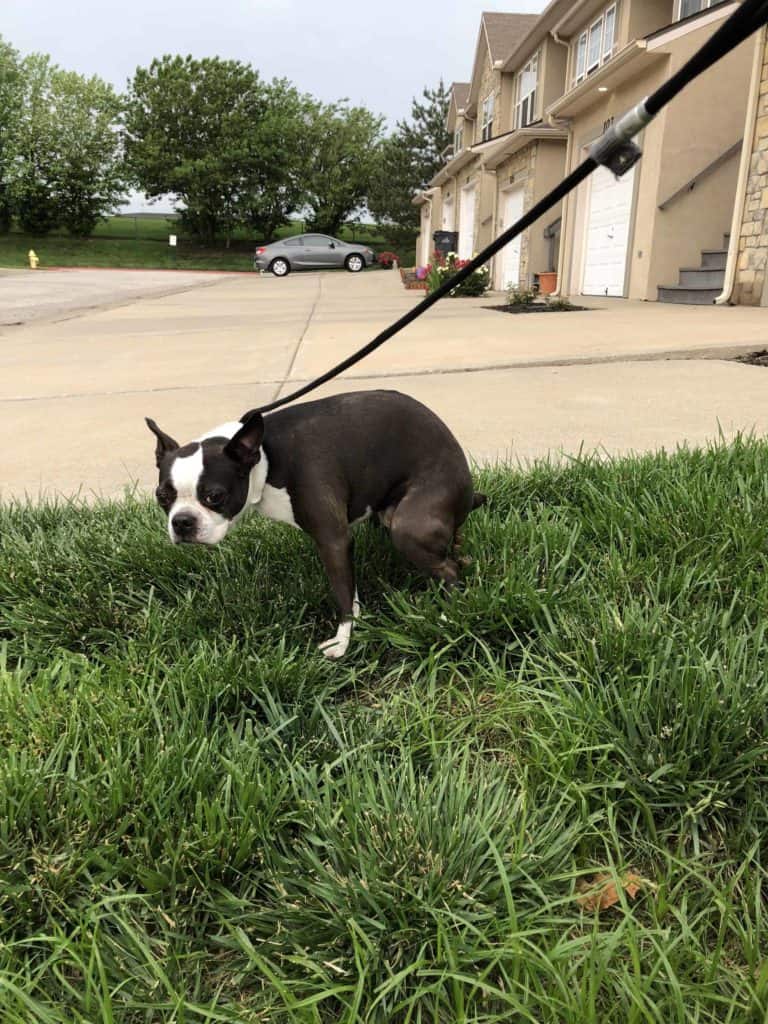Getting a new dog is something to celebrate, and one of the best ways to celebrate is by taking a trip to your vet. Okay, maybe it’s not the most fun way to celebrate, but it’s definitely an essential trip for your pup. The first veterinary visit will set the tone for your dog’s health for the rest of their lives. Plus, this visit gives you a chance to ask those burning questions.

When Should You Take Your Dog to the Vet For the First Time?
The quick answer, as soon as possible! Most breeders and even some shelters will require a veterinary exam within a specified time after you bring your new dog home. This is to make sure that your pup is healthy and not carrying any disease. If you choose to purchase pet insurance, there will typically need to be an exam right away before coverage can start. If your pup underwent any sort of travel on their way to you, a vet exam right away would help ensure that the stresses of their journeys did no harm.
Even if your new dog had a vet exam just before you took them home, it is still a good idea to get them in to see your veterinarian. Not only do these first vet visits help to make sure your new pup is healthy, but it also provides an opportunity to get vaccinations up to date, and to start building a veterinary-client-patient relationship that will last the lifetime of your dog.
What Should You Bring to the First Vet Appointment?
Let’s start off with an easy one, bring your dog, of course! Make sure you can either carry them or safely walk them on a leash. You might even think about putting your pup in a carrier if you have any concerns. Going to the vet can be a scary time, and the last thing you want to happen at the veterinary clinic is for your dog to get away from you.
Remember that most first vet visits happen within the first couple of days of getting a new dog. Your new baby might not fully trust you yet. Do not rely only on your personal bond to help them through this possibly emotionally tough time.
Paper Work
You have got your new dog safely with you, another thing to be sure to bring is any paperwork that you may have received either from the breeder or shelter. The paperwork you receive with your new dog should have information related to known health issues, prior vaccinations, dewormings, or date of birth.
If you didn’t get any paperwork, don’t worry. But, be sure to write down anything about the puppy you can think of, especially comments from the person you bought the dog from. Your veterinarian will be interested in knowing all of these details. If you don’t have any of this information, that’s okay too. You and your veterinarian will still be able to work out a healthcare plan.
Bring A List Of Questions
These questions may relate to diet or training, issues to watch out for, or about pet insurance. You’ve probably heard the saying, ‘there’s no such thing as a stupid question,’ and it’s absolutely true when it comes to veterinary medicine. Vets would much rather have you ask the question than assume the answer and do something that could possibly harm your pup.
Not sure what questions to ask? Check out an article I wrote on, “What Questions To Ask Your Veterinarian.”
Specimens

Most vets will want to see a fecal sample on that first visit, especially if you have a puppy. The receptionist will often ask you to bring one when you make the appointment, but it never hurts to have one ready even if they don’t specifically ask for it. Ziploc baggies work the best for nabbing a little sample. The fresher, the better!
Bring Treats
Take along a few little treats for your dog. As I said before, the vet’s office can be a scary place, and a little food can go a long way in calming an uneasy pup. The first vet visit is also a great time to work on socializing your new dog with people and animals and working on a few basic commands. Treats always help to make this easier.
What Happens At The First Vet Visit?
Be prepared for some paperwork when you first arrive. The vet’s office will need to get your general information as well as some details about your new dog. Birth dates, or at least estimates, are helpful as well as any prior history that you have on your dog.
Going To Your Exam Room
Once the paperwork is completed, a team member should weigh your pup and then take you into an exam room. They may ask you some more questions about your dog and take some vital signs like heart rate, respiratory rate, and temperature.
If your dog has any pre-existing conditions that require blood work, radiographs, or other tests, those will typically be done by a veterinary technician before the vet comes in.
Also, blood may be drawn for a heartworm test depending on your area. This way, the vet will have those results to discuss with you during the exam.
The Veterinarian Will Arrive
The veterinarian will come in next and review your dog’s chart and hopefully exchange some niceties to put your dog at ease. The vet will then perform an examination looking at the eyes, nose, and ears of your pup. Vets will often lift your dog’s lips, looking at teeth and gums, they may open the mouth and check the throat and jaw as well.
The rest of the exam will look more like a massage as the vet checks your dog’s abdomen, lymph nodes, limbs, and tail. Vets will also listen to the heart and lungs and maybe even the abdomen. Any issues noted will be discussed with you.
Medications and Vaccinations
Any vaccinations, dewormings, flea treatments, etc., will be given after the exam.
Questions
Your vet may designate a specific time to answer your questions or take them throughout the entire appointment. Either way, there should be plenty of time to get the answers that you need.
Once the veterinarian is finished and all questioned are answered, you can set up any follow-ups that your dog requires, give your pup a treat for a job well done, and head home.
A Happy Dog Is Key
Do your best to keep your dog happy and calm during the veterinary appointment. This is where the treats come in. Don’t underestimate the calming power of a gentle stroke and praise. Nobody wants your pup to feel anxious and nervous at the vet.
What is the Average Cost of the First Vet Visit?
The price of the first vet visit is going to vary widely based on location. As a general rule, veterinarians in urban areas are more expensive than in rural areas. There will also be some variation depending on if vaccinations, dewormers, or flea treatments are given.
There may be the additional costs of a fecal to check for intestinal worms, heartworm tests, and other tests factored in there as well.
Your dog’s first vet visit will cost anywhere from $100-$300 on average.
If no vaccinations or tests are needed, you’ll be looking more at a cost of under $100. Be aware that some clinics offer discounts for initial appointments to attract new clients, so follow-up appointments may be more expensive. The cost may also vary if you have any sort of pet insurance as well.
Will My Dog Need Any Follow-up Appointments?
This will depend on each dog, but every dog should see their vet at least once a year. These visits should be more frequent as a dog ages or if there are any ongoing issues. New puppies will also need booster vaccinations every three to four weeks. Be sure to ask your vet what their recommendations are for follow-up appointments and to schedule them as necessary.
It’s also a great idea to stop in at the clinic from time to time for weight checks or other fun, non-invasive visits so that your pup doesn’t associate the vet’s office with poking and prodding only. Too often you hear about the dog that gets anxious as soon as the car turns down the veterinary clinic’s street. It doesn’t have to be that way!
Final thoughts…
Even though it may not be at the top of your list of fun things to do with your new dog, that first vet visit shouldn’t be overlooked. With any new dog comes many questions and concerns that are quickly addressed at that first vet visit. It’s the perfect time to get your pet started on the right track for a lifetime of wellness and health.
Also, the first veterinary visit is a great time to set the tone for appointments to come, so let’s all try our best to make that first visit fun, entertaining, and as low stress as possible for the vet, you the dog parent, and first and foremost, your dog.
References
- PetCare Rx – The Annual Pet Visit
